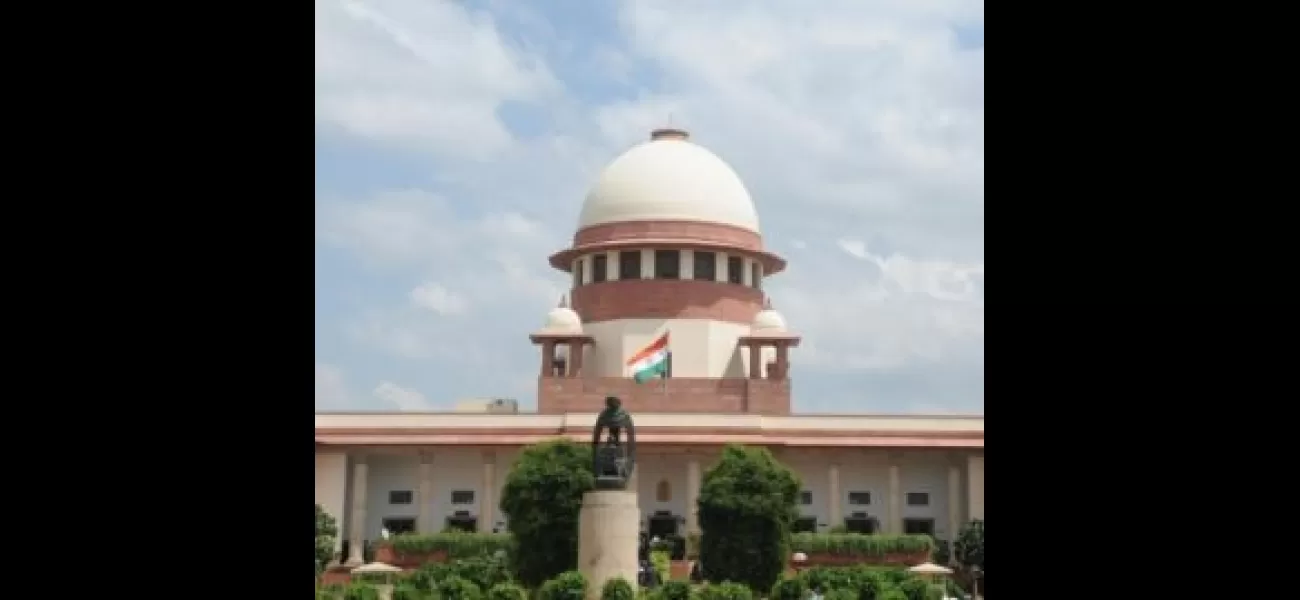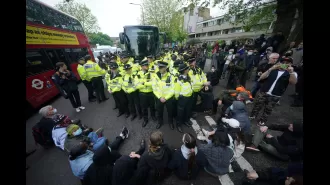SC says political issues will not be allowed in West Bengal's court case
Supreme Court to prevent political issues from being raised during arguments on West Bengal's lawsuit against CBI investigation.
May 8th 2024.

In a recent hearing, the Supreme Court of India made it clear that political matters will not be entertained during the arguments of West Bengal's lawsuit against the Central Bureau of Investigation (CBI). Justices BR Gavai and Sandeep Mehta, who presided over the case, emphasized that the court is only concerned with the legal issue at hand and will not allow either party to bring in political arguments.
The bench has reserved its verdict on whether the state government's suit is maintainable or not. Senior advocate Kapil Sibal, representing West Bengal, argued that once the state had withdrawn its consent in November 2018, the Centre had no authority to allow the CBI to enter the state for investigations. However, Solicitor General Tushar Mehta, representing the Centre, stated that the government has no supervisory control over the CBI's investigations.
During the hearing, Mehta clarified that he had not brought up any political aspect during the previous arguments on May 2nd. He added that the arguments should stick to the technical issue at hand, rather than delving into political matters. He also mentioned Sibal's statement from the previous hearing, where he had claimed that once the CBI enters a state, the Enforcement Directorate (ED) follows suit.
Mehta explained that the ED's role is to count the cash recovered during a probe and that the court's focus should only be on the legal aspect of the case. He reiterated, "We will not permit either of the parties to raise any political issue."
During the arguments, Sibal referred to the provisions of the Delhi Police Special Establishment Act and stated that the state had already informed the court of the cause of action. He argued that the CBI cannot enter a state without the state government's consent and cannot do so on its own.
Sibal further added that the state government has the power to grant or withdraw consent for the CBI's investigations. He emphasized that once the state has withdrawn its consent, the Union government cannot allow the CBI to enter without the state's permission. He stated that granting consent is a privilege and the power to grant or withdraw it lies with the state.
In response, Mehta clarified that there was no cause of action against the Centre in this matter. He stated that the Department of Personnel and Training (DoPT) does not register cases and cannot direct the CBI to register an FIR or supervise its investigation. He also dismissed the statement that the CBI is a police force of the Union as "devastating". He reiterated that the Union government does not have the power to direct the CBI to register an FIR for a particular offence.
The Centre has previously told the apex court that the CBI is not under the control of the Union government and the government cannot supervise the agency's actions. This statement is significant as the opposition has accused the government of misusing central probe agencies like the CBI and ED to target its rivals.
The Centre has raised objections about the maintainability of the lawsuit filed by the West Bengal government, stating that there is no cause of action against the Union of India. The state government, on the other hand, has filed an original suit under Article 131 of the Constitution, which deals with the Supreme Court's original jurisdiction in disputes between the Centre and one or more states. The West Bengal government had withdrawn its general consent to the CBI on November 16, 2018, citing reasons of sovereignty.
The bench has reserved its verdict on whether the state government's suit is maintainable or not. Senior advocate Kapil Sibal, representing West Bengal, argued that once the state had withdrawn its consent in November 2018, the Centre had no authority to allow the CBI to enter the state for investigations. However, Solicitor General Tushar Mehta, representing the Centre, stated that the government has no supervisory control over the CBI's investigations.
During the hearing, Mehta clarified that he had not brought up any political aspect during the previous arguments on May 2nd. He added that the arguments should stick to the technical issue at hand, rather than delving into political matters. He also mentioned Sibal's statement from the previous hearing, where he had claimed that once the CBI enters a state, the Enforcement Directorate (ED) follows suit.
Mehta explained that the ED's role is to count the cash recovered during a probe and that the court's focus should only be on the legal aspect of the case. He reiterated, "We will not permit either of the parties to raise any political issue."
During the arguments, Sibal referred to the provisions of the Delhi Police Special Establishment Act and stated that the state had already informed the court of the cause of action. He argued that the CBI cannot enter a state without the state government's consent and cannot do so on its own.
Sibal further added that the state government has the power to grant or withdraw consent for the CBI's investigations. He emphasized that once the state has withdrawn its consent, the Union government cannot allow the CBI to enter without the state's permission. He stated that granting consent is a privilege and the power to grant or withdraw it lies with the state.
In response, Mehta clarified that there was no cause of action against the Centre in this matter. He stated that the Department of Personnel and Training (DoPT) does not register cases and cannot direct the CBI to register an FIR or supervise its investigation. He also dismissed the statement that the CBI is a police force of the Union as "devastating". He reiterated that the Union government does not have the power to direct the CBI to register an FIR for a particular offence.
The Centre has previously told the apex court that the CBI is not under the control of the Union government and the government cannot supervise the agency's actions. This statement is significant as the opposition has accused the government of misusing central probe agencies like the CBI and ED to target its rivals.
The Centre has raised objections about the maintainability of the lawsuit filed by the West Bengal government, stating that there is no cause of action against the Union of India. The state government, on the other hand, has filed an original suit under Article 131 of the Constitution, which deals with the Supreme Court's original jurisdiction in disputes between the Centre and one or more states. The West Bengal government had withdrawn its general consent to the CBI on November 16, 2018, citing reasons of sovereignty.
[This article has been trending online recently and has been generated with AI. Your feed is customized.]
[Generative AI is experimental.]
0
0
Submit Comment





